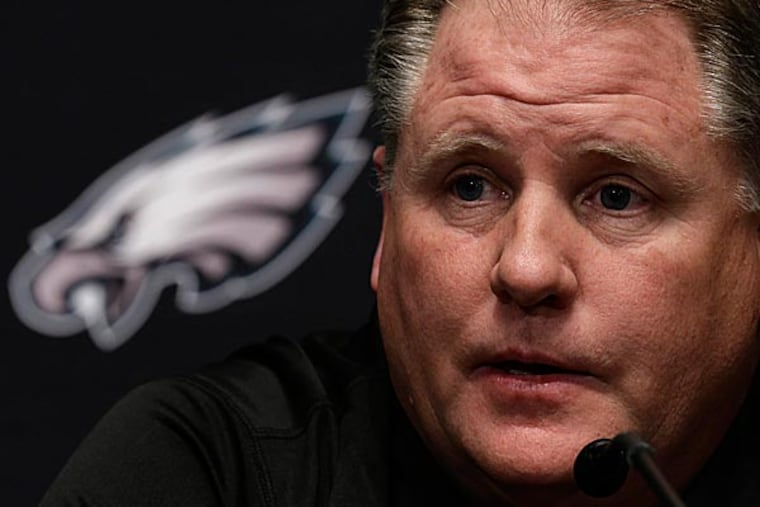How far can Chip Kelly push the Eagles' pace?
'IT'S A mathematical game," Chip Kelly was saying. He was talking about the extra man a defense can put in the box near the line of scrimmage, and the quarterback's ability to read that extra man and control him. But the Eagles' new coach was talking about more than that.

'IT'S A mathematical game," Chip Kelly was saying. He was talking about the extra man a defense can put in the box near the line of scrimmage, and the quarterback's ability to read that extra man and control him. But the Eagles' new coach was talking about more than that.
You ask him about playing fast, one of his trademarks at Oregon. A lot is involved - a conditioning element for the players, a drastic shortening in what has been the typical verbiage involved in calling plays, and more. NFL teams have begun to trend toward more plays per game, but they aren't to where the fastest college teams are.
There are complications in the comparison, of course - specifically, the difference in timing rules between college and pro games. Pro games are faster, and it is harder to jam in more plays. With that:
The average NFL team ran 64 plays per game in 2012. The Eagles, the sixth-fastest team in the league, averaged 67 plays. The Patriots - schooled by Kelly and, by far, the fastest-paced team in the NFL - averaged 74 plays per game.
Oregon last year?
Try 81 plays per game.
But how far can Kelly push it with the Eagles? The question is unanswered and unanswerable right now. When you ask him whether the NFL has only scratched the surface of playing a fast-paced game, he is careful not to make pronouncements about something he has not investigated.
"I don't get a chance to study the league in-season, so I don't have all that data," Kelly said. "I know I can catch it out of the corner of my eye as we're breaking down game film or going to the bathroom - who's winning, who's not winning. I'm aware that the plays have gone up, but how they're doing it exactly - I haven't had a chance to study it, so I can't comment and say if it's fair to say that they're just scratching the surface.
"This game, everybody's always trying to get an advantage. It's [about] the next great thing, so to speak. I'm not saying this is the next great thing, but if you can force the pace in the game . . .
"But there's so many different things that get involved in that. It's not like buying something off the shelf . . . It has to be a total implementation, from what you do in the offseason to how you practice during the week to what you do on game day."
The advantages of playing fast are obvious enough. Defense in the NFL is more reactive than anything, and if you give a defense less time to react to your formation and/or your personnel, the thing tilts even more in the offense's favor. Plus, there can be a fatigue issue for a defense that does not have time to change personnel during an entire series.
Kelly already has acknowledged that the length of an NFL season and the smaller sizes of NFL rosters compared with college teams will prevent him from running the same manic practices he ran at Oregon. The further question, voiced by many, concerns whether you can push the tempo too hard for older and often bigger NFL offensive linemen to keep up.
Kelly seems less concerned about that.
"I think," he said, "if you have a bunch of guys that want to win, I don't know if guys say, 'Coach, we don't want to score points.' I haven't encountered people like that. I don't think there are people like that . . . You hear that and, with a lot of things, there are a lot of generalizations that go on all the time. But the teams that are successful want to win.
"If you can give them an advantage in how to win, I think they'd be nuts if they didn't buy into it."
That, then, will be the sales pitch to a veteran NFL roster - and the buy-in will be the thing all of us attempt to measure. We all will see whether the man and his resumé and the mathematics of the thing will make the difference.
On Twitter: @theidlerich
Columns: philly.com/
RichHofmann